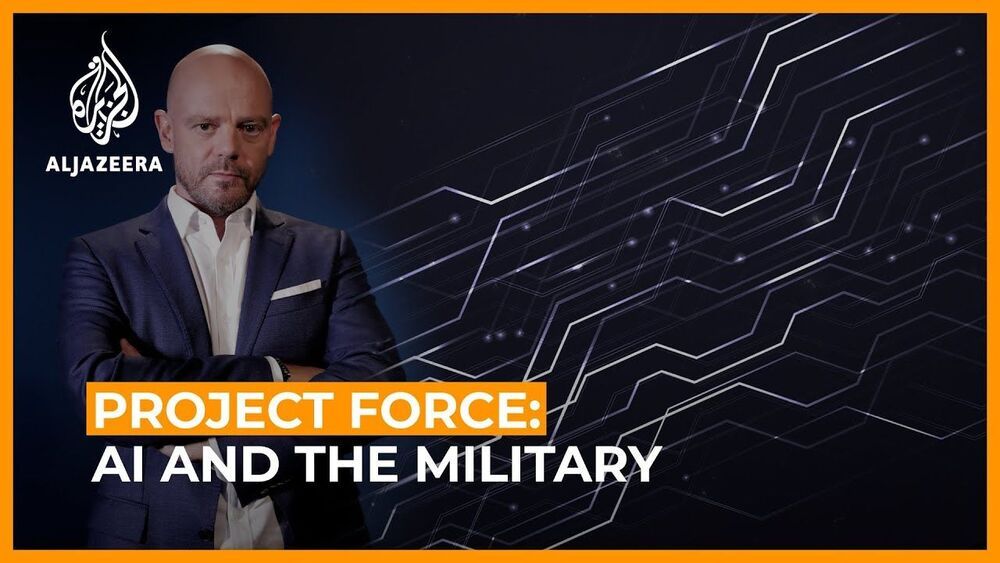Jul 28, 2021
CRISPR breaks ground as a one-shot treatment for a rare disease
Posted by Quinn Sena in category: biotech/medical
CRISPR reached a big milestone this year by treating a disease inside the body—here’s what’s next for the technology.
CRISPR reached a big milestone this year by treating a disease inside the body—here’s what’s next for the technology.

“Killer Robots” may seem far fetched, but as @AlexGatopoulos explains, the use of autonomous machines and other military applications of artificial intelligence are a growing reality of modern warfare.
Follow us on Twitter
https://twitter.com/AJEnglish.
Continue reading “AI and the military: Friend or Foe? | Project Force” »
Experimental facilities around the globe are facing a challenge: their instruments are becoming increasingly powerful, leading to a steady increase in the volume and complexity of the scientific data they collect. At the same time, these tools demand new, advanced algorithms to take advantage of these capabilities and enable ever-more intricate scientific questions to be asked—and answered. For example, the ALS-U project to upgrade the Advanced Light Source facility at Lawrence Berkeley National Laboratory (Berkeley Lab) will result in 100 times brighter soft X-ray light and feature superfast detectors that will lead to a vast increase in data-collection rates.
To make full use of modern instruments and facilities, researchers need new ways to decrease the amount of data required for scientific discovery and address data acquisition rates humans can no longer keep pace with. A promising route lies in an emerging field known as autonomous discovery, where algorithms learn from a comparatively little amount of input data and decide themselves on the next steps to take, allowing multi-dimensional parameter spaces to be explored more quickly, efficiently, and with minimal human intervention.
“More and more experimental fields are taking advantage of this new optimal and autonomous data acquisition because, when it comes down to it, it’s always about approximating some function, given noisy data,” said Marcus Noack, a research scientist in the Center for Advanced Mathematics for Energy Research Applications (CAMERA) at Berkeley Lab and lead author on a new paper on Gaussian processes for autonomous data acquisition published July 28 in Nature Reviews Physics. The paper is the culmination of a multi-year, multinational effort led by CAMERA to introduce innovative autonomous discovery techniques across a broad scientific community.
Synchron has beat rival Neuralink to human trials of its “implantable brain computer interface.”
The chip will be studied in six patients later this year as a possible aid for paralyzed people.
Elon Musk previously used Neuralink’s chip in a monkey, which then played video games with its mind.
He is absolutely correct. If anything he down played the danger.
In addition to fewer people being born than dying, it’s that, with life spans now far greater than ever before, the percentage of the population MOST in need of medical services will increase at the same time, with fewer doctors, fewer nurses, fewer researchers, and far more resources needed for all of it.
To put it in a more cinematic way, think less “Soylent Green” and more “I Am Legend”.
The future of NASA’s Space Launch System is in question after another contract win for SpaceX.
NASA has selected the SpaceX Falcon Heavy rocket to launch the Europa Clipper in 2024, putting the future of NASA’s own flagship rocket into question.
Scientists have picked up light from the other side of a black hole for the first ever time.
Such an observation might seem not just difficult but outright impossible, given black holes famously eat up any light that goes near them.
But the new study used an unusual effect where light “echoes” around the black hole, such that scientists can see it from the other side.
Adapters, dynamic pricing, and a big expansion.
Tesla CEO Elon Musk has always talked about opening up his company’s vast network of Supercharger charging stations to other EVs, but now he’s shared some details about how it might actually work.
Money will be used to ramp up the rollout of battery-free sensor tags and novel, AI-based sensing as a service business model.
Wiliot — the IoT startup that has developed a new kind of processor that is ultra thin and light and runs on ambient power but possesses all the power of a “computer” — has picked up a huge round of growth funding on the back of strong interest in its technology, and a strategy aimed squarely at scale.
The company has raised $200 million, a Series C that it will use toward its next steps as a business. In the coming months, it will make a move into a SaaS model — which Wiliot likes to say refers not to “software as a service,” but “sensing as a service,” using its AI to read and translate different signals on the object attached to the chip — to run and sell its software. This will be combined with a shift to a licensing model for its chip hardware, so that they can be produced by multiple third parties. Wiliot says that it already has several agreements in place for the chip licensing part. The plan is for this, in turn, to lead to a new range of sizes and form factors for the chips down the line.
Softbank’s Vision Fund 2 led the financing, with previous backers — it’s a pretty illustrious list that speaks of the opportunities ahead — including 83North, Amazon Web Services, Inc. (AWS), Avery Dennison, Grove Ventures, M Ventures, the corporate VC of Merck KGaA, Maersk Growth, Norwest Venture Partners, NTT DOCOMO Ventures, Qualcomm Ventures LLC, Samsung Venture Investment Corp., Vintage Investment Partners and Verizon Ventures.
